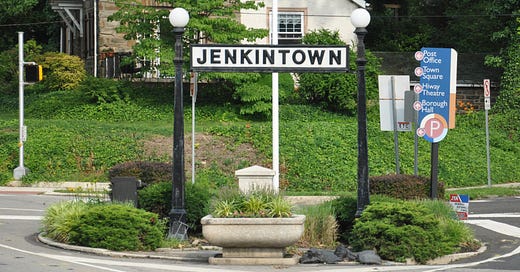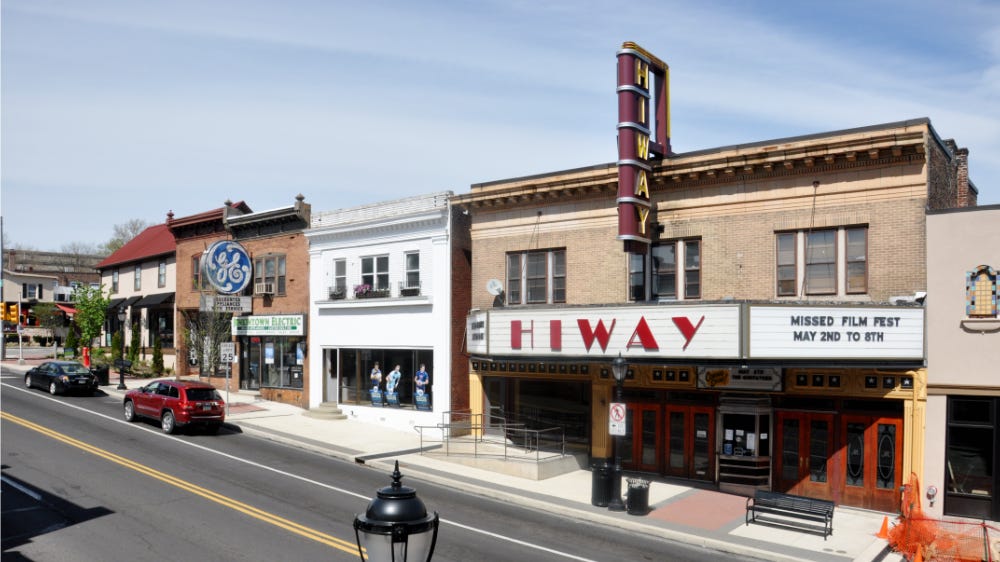Love Letter to Jenkintown
The town that embodies all we wanted in a community disabuses us of it.
In September of 2002, while on a road trip through the Maryland countryside with my future wife, I took a call from a prospective employer and got some bad news. Going on my ninth year living in Worcester, I hoped to land a job at Worcester Publishing as the art director for the Worcester Business Journal. Despite the fact that I knew the owner of the company and had the occasional breakfast with him at Charlie’s Diner, I did not get the job. That was strike three. Previous to that, I interviewed for art director and then editor of their flagship publication Worcester Magazine and whiffed.
I politely thanked the caller, clapped closed my StarTac, and said to Louise, “Well, it looks like I’m moving to Pennsylvania.”
Louise would soon purchase her recently deceased mother’s house in Jenkintown from the estate. She would get a sweetheart deal, but the house wasn’t perfect. It had a tiny kitchen that could barely fit two people standing up as well as other issues. As she grappled with the decision whether or not to buy the house or to let the estate sell it and split the proceeds with her siblings, I said something that tipped the decision and would later prove fateful:
“You can always improve the house. You can’t always improve the location.”
This is the classic case of “be careful what you wish for” scenario. Jenkintown embodied the Recipe. It had a marginal retail district, houses with porches, ample walkability, easy train access, and diners nearby. The little house we soon settled into checked off four of those five boxes. We wouldn’t have a porch and I thought that in a town such as this, the business core was ripe for a comeback.
I never before lived outside of Massachusetts. I felt comfortable in Pennsylvania and in the outskirts of Philly, living in this picture-perfect traditional suburb with easy access to trains and all the culture that Philadelphia has to offer. I always looked forward to trips to this state, so I didn’t give this move a second thought.
Twenty years later, we have decided it’s time to again consider moving. Our daughter finally graduates from high school next month, and like many parents before us and many to come, we hope to feather our empty nest in a place with a little more room, a lot lower taxes, and ironically for me, no sidewalks.
…we hope to feather our empty nest in a place with a little more room, a lot lower taxes, and ironically for me, no sidewalks.
If you drive through this town for the first time, you’ll find much to love about it. We have an amazing array of housing types within our square mile, a well-regarded school system of only 740 kids, and easy access to frequent trains that whisk you to Center City in a half hour. None of that matters to us any more.
Taxes are high here, and those who manage this town and its school district seem dismissive about the burdens this puts on lower-income residents. I’m well aware of the pressures that recent economic conditions have put on local budgets, but I do not think that the response should ignore their plight — especially when it doesn’t have to.
Our Jenkintown experience took a major turn for the worse about seven years ago. I could write a book about it, but for now, I’ll simply say that a municipal action reared its ugly head and put us in a serious financial bind. Instead of trying to work with us to mitigate the hardship it imposed, the Borough and not a few of its residents effectively told us to sit down, shut up, or get out.
Complaining about local government is as old as government. However, one might think a town as small as ours might establish more direct and personal connections to those who manage its affairs, and do so with all-possible-transparency. How hard is it to email or text or simply knock on doors? Why does Borough Hall so often become the place where love of community goes to die?
Perhaps, we now live in an era of revolving-door neighborhoods, but I don’t want to be like my 95-year-old neighbor, a lifetime resident still lucid and active, who recently said to me, “I hate this town now. It’s nothing like it used to be.”
The experience here undermined several of my beliefs about a few things, specifically about getting involved and about the actual value of living in a walkable community. Despite our good fortune of living in one, we discovered many here care more about protecting parking spaces than creating equitable methods of funding pedestrian infrastructure.
We will leave behind a much-improved house. After twenty years, the location will remain much the same as we found it.
Do you have an experience fighting city hall? Tell us about it in the comments.






Having lived in Knoxville now ten years, just a random place where a house was affordable, after reading about your experience in Wormtown and Jenkintown u get the sense it's all the same - America is one big strip mall with side roads that can often produce delight. Sorry about those taxes up north. Mine are fixed at 400$ a year so i never complain. The northern states, filled with winter and high prices are a deep mystery to me now why anyone would want to permanently anchor there
We can write a book .